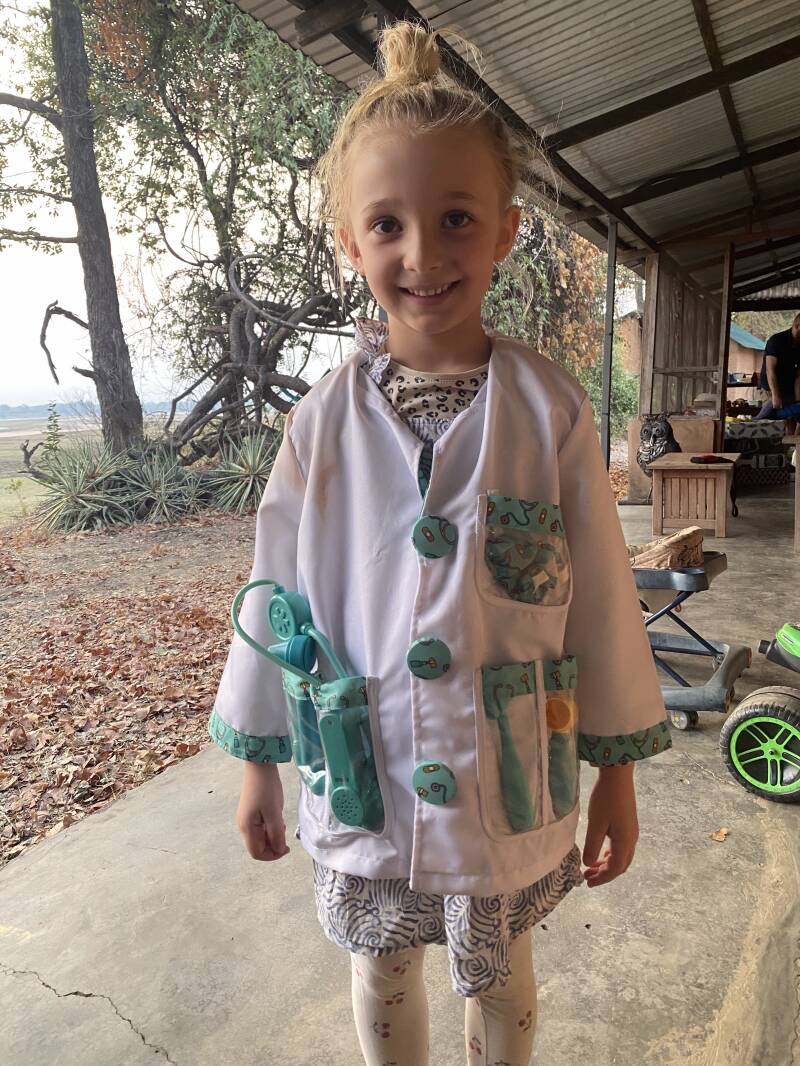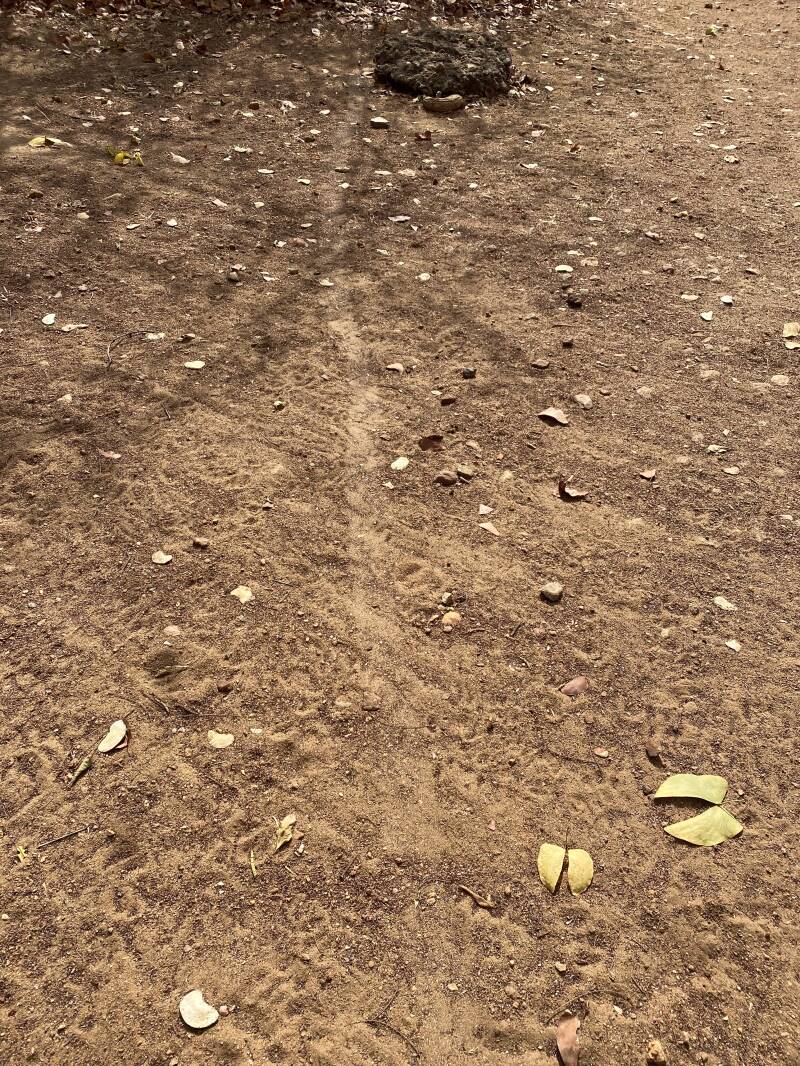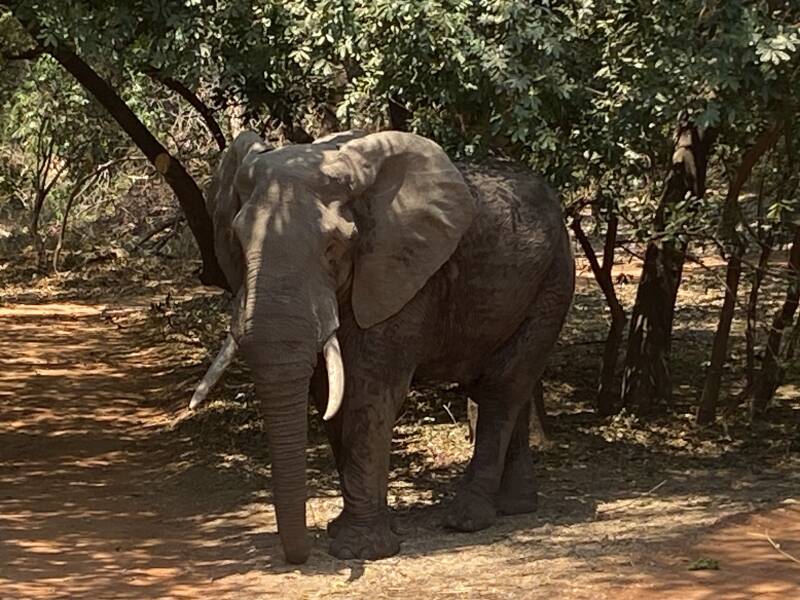
Photo of the week
Highlight of the week: We spend a day learning about elephants (Next weeks blog)
Lowlight of the week: A difficult couple of days at the clinic
Maximum temperature: 40 degrees Celsius - but now in the midst of a cold spell
Rainfall: Still waiting
I was at medical school in the days of Hippocrates. He was one of my favourite teachers for sure. His Latin teachings were mostly over my head. But one thing that he taught me has always made sense. Primum non nocere. First do no harm. It is tattooed on the inside of my eyelids. My only tat’.
Inexperienced and poorly trained clinicians leave carnage in their wake. We are all responsible for a greater or lesser decimation of the healthy population. Every time that we cast our diagnostic wand. We risk being wrong. And causing very real harm.
A sore throat would typically attract a British prescription pad in the 1990s. A way to shorten a consultation. A foolish shortcut. Inviting doctor dependency and worse. And so too is it in Zambia. Our eager, and briefly trained colleagues do their best to fit people into diagnostic boxes. How else are they to decide on what treatment is needed?
Andrew is 22 years old. A bright man. Sponsored to attend Lusaka University. Conservation flowing in his blood. A bright future awaits Andrew. But he is held back. By a diagnostic label. A sword of Damocles hangs over him. Not allowed to work as a park ranger with a heart condition. Constantly waiting to be scythed by the grim reaper.
We are asked to see Andrew by his work placement supervisor. He has a heart problem. The supervisor wants to know which kid gloves to choose. Which cotton wool to wrap Andrew up in. When to say no. The supervisor wants advice from an occupational health physician and from a heart doctor. We check our job descriptions. We seem to fit the bill.
Conscientious Andrew is waiting as we draw up to clinic at 09:00. A quiet clinic allows me to peel straight off and delve into Andrew’s story. His immaculate English allows me to get the story straight from the horse’s mouth, so to speak. No random translation and interpretation to contend with.
It started last year. I get a pain in my heart. Andrew points to the left side of his chest. I was told I have bruising and damage to my heart. I also have high blood pressure. They told me that this is a silent killer. He describes the pain to me in great detail. A pain that only occurs at night. While he is sleeping. It wakes him up. Sharp. It sometimes hurts to take a deep breath in. Lasting 5 minutes. It scares him. He feels his heart racing. A little breathless. The pain then goes. And sleep returns. Never gets pain during exercise. Football and riding a bike unimpaired. Fit and muscular.
I struggle to equate this with a heart issue. Let alone with a serious heart problem. I ask more questions. But get negative answers to everything.
I examine Andrew. He ticks every box of peak physical fitness. His blood pressure normal. His heart working in tip top condition. Not a murmur of any heart issue. Not even a whisper.
Andrew hands over his medical records. I inspect the archives of his comprehensive medical notes.
As a junior doctor, I was always intimidated to see a patient who had previously been assessed by a senior clinician. Especially for a specialist problem. What could I add to the management? But this intimidation was quickly erased by my erstwhile boss, Mohammed. His sage advice was: Always assume that the previous doctors have got it all wrong. See the patient with a blank slate. Take your own history. Do your own examination. Review the test results. Make up your own mind. Mohammed’s mantra guided me to pick up a host of new problems. To change diagnoses. To undo harm done. Mohammed’s mantra is solid gold. I pass it on to anyone who gives me the time of day.
Back to present day Zambia: Andrew’s medical records in hand, I explore. Happily Andrew holds his own records. Record systems in Zambia are patchy. A scrap of paper. An exercise book. On a good day the narrative is clear. More often there are voids and chasms. Interpretations and Chinese whispers. Nowadays we have a spanking new computer system at Kakumbi. Clunky. Slow. Reliant on an ethereal Wi-Fi network. Reliant on very elusive electricity. And not especially supportive of effective communication between patient and clinician. But vaunted by management. Because it helps them to keep track of stock. How much help do you really need to count to zero? Just open the door to our drug storeroom. Disappointment lies within.
But I digress. Back to Andrew. He has been to the big University Hospital in Lusaka. He has some proper notes. And some test results. I scan the written record. The history they have documented is similar to mine, but sketchy. It reads something like: Chest pain. ?Heart Attack. BP 145/89 Plan: ECG. Diagnosis: Hypertension. Heart Attack. Treatment Isosorbide Mononitrate. Atenolol. Brief. Pithy. And totally off target. With some potentially dangerous medication added in for good measure.
Andrew’s notes include an ECG. A good quality one. I pore over it. It has a couple of minor abnormalities. Nothing of significance. Certainly nothing to indicate a heart attack. Or any damage to the heart muscle. Most ECG machines these days provide an AI interpreted report. AI might be short for Artificial Intelligence. But AI might also be short for Absolutely Inept. If the AI states: Normal ECG, all well and good. However, if the software picks an irrelevant niggle it will state prominently: Abnormal ECG. Leading both the inexperienced clinician and the anxious patient merrily up the garden path. The consequences can be dire. A person becomes a patient. Maimed for life. In Andrew’s notes, the AI interpretation Abnormal ECG was noted down. And from that day forth Andrew had a heart problem.
Andrew even had an Echocardiogram. The valves pristine. The muscle immaculate. All reported as normal. Amazingly for Zambia, Andrew also had a bunch of blood tests. All of these failed to confirm a problem with the heart.
As a medical student I fantasised that I might someday heal people in a single consultation. Clearly I’m not the Messiah. But I quickly discovered as a doctor, that it was possible to do just that. A confident diagnosis made with a quick history and the knowing use of a stethoscope. Could this be precordial catch syndrome? The demographic classical. Young and fit. Reassured that life was not about to ebb away. Among my favourite diagnoses.
Andrew has precordial catch syndrome. I apologise for the Latin mouthful. His new harmless diagnosis leaves the heart problem solidly in the past. Andrew’s pain is coming from his chest wall. A muscular pain. The Latin name designed to add legitimacy to a problem that cannot be tested for. Andrew is a smart lad. He buys into my confidence.
Andrew’s blood pressure had been up because he had been anxious. His ECG was normal. His echocardiogram normal. His heart normal. Through good sense Andrew had long since stopped his medicines, because they had made him feel worse. Why don’t more patients do the same?
I spent half an hour with Andrew. I invested in un-diagnosing his disabling heart condition.
A medical label is easy to award. Hard to dispel. The label can change a life. Reroute a career. Halt activity. Remove a zest for life. Andrew had lived with the label of a serious heart condition and a silent killer for more than a year now. His relief was palpable, but tempered with some disbelief. How could so many other doctors get it so wrong, for so long? How do you know that you are right Doctor Ginny?
Andrew continues to carry around a pile of fancy medical notes. With a printed report saying that his ECG is abnormal. But he also now has a simple school exercise book. With my detailed history and my detailed examination. His normal blood pressure is documented. My ECG re-interpretation written large. The true diagnosis clear. Ultimately, Andrew’s healthy heart will declare itself fit for purpose. Simple truth outweighs high tech’s artificial diagnosis. Andrew’s cardiac diagnosis is eclipsed by a precordial catch. His future is bright.

Avy, our special assistant - has way more kit than we do

This might look like a bit of mud. In fact it is the trail of a puff adder - leading straight to our house. We have not found it YET.

Our latest visitor - lying in wait by Keith's side of the bed

Casing the joint. His big brother broke in later that day

A visitor at the office
Add comment
Comments
A very satisfying outcome- well done and lucky Andrew! Love the baboon photo… he does look shifty.
Love this story. Was his bp lower with you?
Yes - his BP was totally normal with us
Brilliant work guys. Can we book an appointment so we can pop over 😂. Best to keep on checking under the bed for that snake !!! xx
Outstanding, as usual
Excellent work Ginny! As ever
Love your assistant too 🥰🥰
You'd make great detectives! Well done guys x
Another excellent read, I was thinking about conversations re chest pain and GERD / GORD and was thinking that might be Andrew's issue or some other MSK issue?
SADS week this week, your blog comes at the right time. How many young people have an ‘abnormal ECG’ and stop living their healthy sporty life after random screening… I will promote defibrillator awareness and how to do CPR for as long as I can! Thank you for this blog, shared with my colleagues ❤️
Great story. What a difference you made in Andrew’s life!
Nice one! Great to read.
I do like Mohammed's mantra.
Hope the puff adder doesn't reveal himself unexpectedly!
Maybe the puff adder will scare off the burglar baboons?